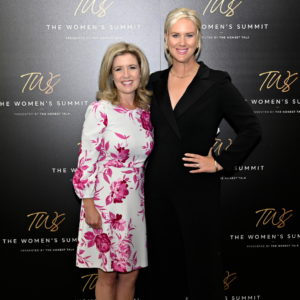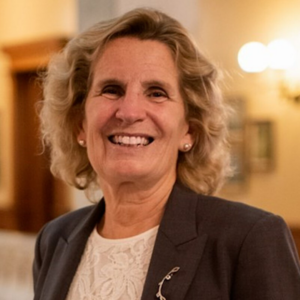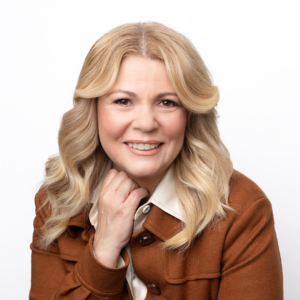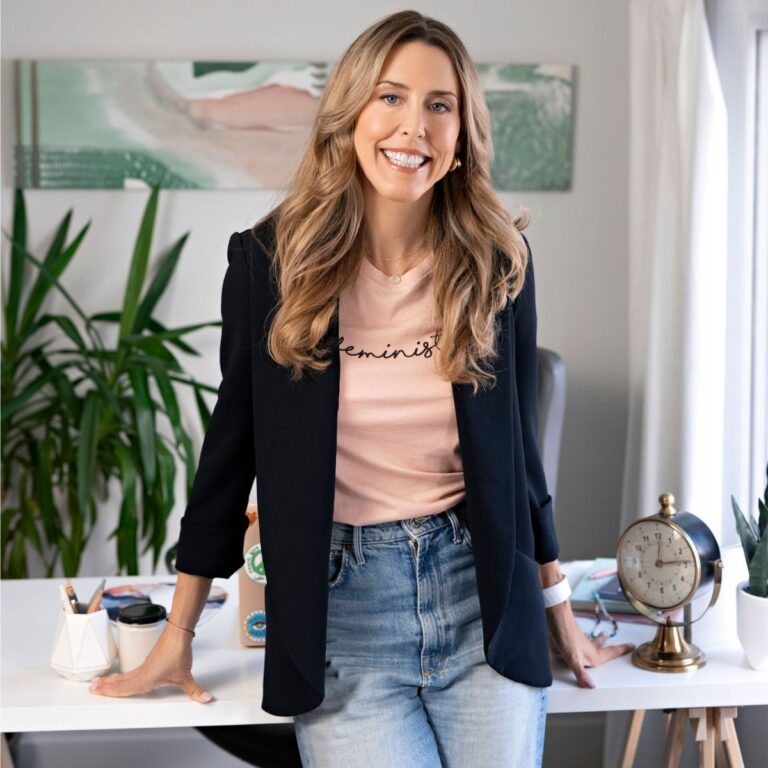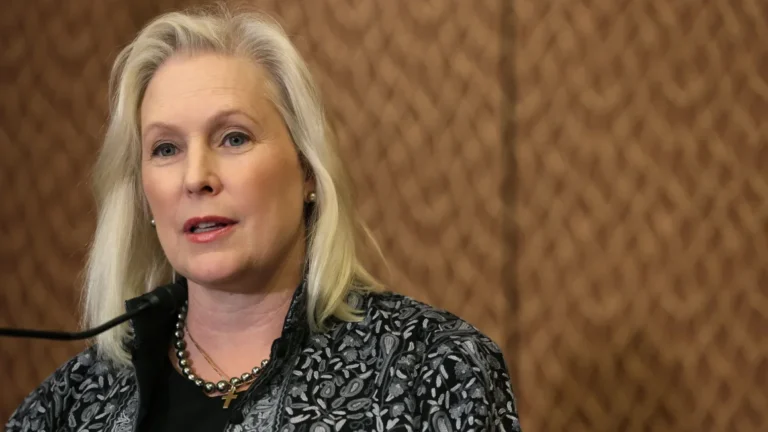Nicole Verkindt – Entrepreneur, angel investor and CEO
You could say that Nicole Verkindt was born into business. The child of aerospace industry entrepreneurs, she founded her own global company called OMX in her twenties, and she hasn’t looked back. Most Canadians know Nicole from her stint as a Dragon on CBC’s popular Next Gen Den and from her frequent media commentary, and this award-winning business leader continues to smash glass ceilings everywhere she goes.
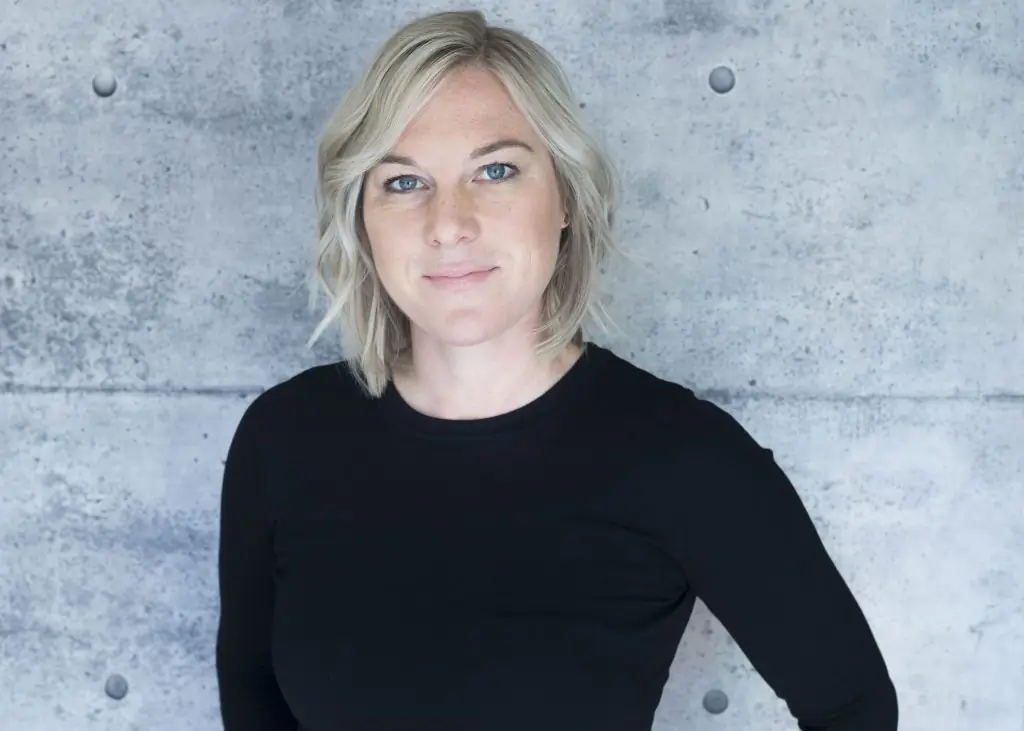
How her parents influenced her entrepreneurial journey
Jennifer Stewart: Your entrepreneurial journey has been influenced a lot by your parents. How did they influence you? And what role has that played in your journey?
Nicole Verkindt: When I look back, my entire childhood revolved around the family business. And it just didn’t feel like they had a job, it felt like we were all in this family business. We were in a trailer on our property that we had bought that we were planning to build a house on, but couldn’t because we’d risked everything on this new engineering technology.
My mother was the controller, my father was the chief engineer and CEO and I just remember every morning over breakfast, they would be fighting over who should be fired, or how much extra money was spent on something that shouldn’t have been. It just permeated everything. I saw the downs of it, I saw the crazy amount of hours and fights, and every single family vacation we went on was tied to going to visit a supplier.
After university I worked in a commission-only sales job, so it wasn’t an entrepreneurial thing at all. But I had to learn to sell, I had no salary. And I just remember thinking about wanting to start my own thing because it just felt like this natural next step.
Catherine Clark: A lot of people would take the experience that you had growing up and they would run like the wind away from the idea of small business or starting your own company. You didn’t do that. What was so interesting to you and so motivating to you about being an entrepreneur and running your own thing.
Nicole Verkindt: When people used to ask me what I wanted to do, I said there’s only one thing I don’t want to do and that is to run the family business, so I was totally running away from that particular business. I ended up starting my own small manufacturing supply chain business but then the family business got into trouble and our sales dropped significantly and I ended up getting pulled back into the family business to basically do a massive restructure, which was an incredible lesson to learn at the age of 26 or 27.
On cutting overheads dramatically and costs and sort of right-sizing the business that had gotten into a lot of overhead. And so that’s how I got back into the family business. But I just have never felt completely comfortable in other environments — sometimes people only know what they don’t want, they don’t really know what they want.
Being a woman entrepreneur
Jennifer Stewart: So you came in, you restructured your parents business in your mid-20s. And then how did you have the idea for OMX? How did you get it off the ground?
Nicole Verkindt: I had this long-term frustration in the industry. I didn’t really know anything else. So I just thought, well, I’ll just innovate and do something in this space. It wasn’t necessarily that I had this one eureka moment — I just wanted to get on the ice and start playing and hope that something would happen. I find a lot of entrepreneurs focus so much on what the idea is, which isn’t bad, but I prefer the mentality of, “I know a little bit about this, and I want to make something in that sector overall better.” And you start working on it.
Once I got in there, and I’m sitting there next to the customer, and the customer is saying, “You know what’s really annoying” or “What I really have budget for is XYZ” — we would run back and build those features, and then launch that and try to sell that. And so I’m a big fan of spending less time on the pontification process, which is a fun process, but less time on that and more time sitting next to the customer and hearing what they’re saying. And then trying things and seeing if they’ll actually pay for them.
Jennifer Stewart: What can we do better as both female entrepreneurs and just entrepreneurs in general to take those risks and just throw something at the wall and work really hard to make it work, but not be so timid and trying make sure that everything is perfect and tied up in a bow?
Nicole Verkindt: It’s a much bigger issue around just our ability to accept and be okay with failing. And I think that maybe women have a harder time at that, and that Canadians have a harder time with it — we like to save face a little too much. We don’t have enough of these messy, honest talk conversations that the actual process of innovation involves an enormous amount of failure. And if you’re not failing, then you’re probably not doing it right.
So I think that accelerators are useful, but to me, you just have to get out there. You’ve got to get knocked down; you’ve got to keep doing stuff. And unfortunately, it takes time and it takes money. And so the education that entrepreneurs should be getting is about how to speed up the process so that they are burning less cash getting to that sweet spot.
Catherine Clark: Does it bother you when people qualify that you’re a woman entrepreneur, a female entrepreneur? Or do you think that’s part of your strength?
Nicole Verkindt: It doesn’t bother me at all. I just have other things to worry about. About a year ago, I started doing different events for young women in high school and Junior Achievement and those types of things where they’re really looking to role models that are 10 to 15 years older than them. I never saw myself as that, but if I can be that, then that’s great. I think people need to see it to imagine themselves in that role.
The biggest hurdle in career
Jennifer Stewart: What’s been the biggest hurdle in your career so far? What did you learn from it?
Nicole Verkindt: Oh, gosh, so many hurdles, I think the thing I struggled with the most is all of the negative feedback, and finding that balance between what I should ignore versus a customer telling me something that I really need to hear and I need to not take it personally. If I listened to everybody, I would never be where I am.
Catherine Clark: Can you talk to us a little bit about putting yourself out there despite knowing that criticism may come back?
Nicole Verkindt: I don’t think that I’m necessarily doing it perfectly. I think that it’s tempting for people to want to stay perfectly politically correct, but then I started to realize that if you’re too politically correct, you’re kind of not saying anything. It’s really important, from the entrepreneurial side, for people to hear what you have to say directly, because it’s hard to decipher something that’s kind of middle of the road. I’ve just been focusing on what’s the real message that I want to get across? And what do I feel is honest about what my experience was?
Why diverse boards generate more profits
Catherine Clark: I want to ask you about diversity on boards, because it’s something that’s really important if we’re going to make more voices heard. How do we do that? How do we make that change? Because it is so slow in coming.
Nicole Verkindt: A corporation is established to maximize profits — let’s just be very honest about that. There is significant data that shows that diverse boards generate more profits. And so to me, that’s the end of the conversation. I don’t think that we should do it because it’s the right thing, I think that we should do it because you create stronger organizations with diverse boards.
Not only can you reach a wider range of consumers, you can think like different types of consumers that you’re trying to sell to. If you want to be more profitable, you want to take on less risk, then you should be focused on having a group of diverse leaders and diverse boards. And heck, your whole team should be diverse for that reason.
Jennifer Stewart: Tell us a little bit about what it was like being on CBC’s Next Gen Den.
Nicole Verkindt: It’s exactly like what you see, because there wasn’t very much editing. I think we filmed the whole season in two days, but we must have seen 30 pitches or so and then maybe they use half of them. For me, I was sitting in that chair, learning a lot about how to be good at pitching. And the short answer to that was, try to answer all of the investors questions as early as possible.
But the bulk of my Dragon’s Den experience happened after the filming, which is working with the startups that I ended up investing in, seeing what went wrong or what went right, and which ones ultimately did well and which ones didn’t. And the punchline to that whole experience was that it really comes down to the entrepreneur, their headspace, their expertise, their true desire to go after an industry. They can keep tweaking that idea over time as they get feedback from the market as long as they’re committed and in it for the long run and not wanting to exit in a year, for instance. One of my investors said to me that he invests in the jockey not the horse. So it’s the entrepreneur, not the idea.
Her career path from past to future
Jennifer Stewart: You have mentioned before that you wanted to be a pilot when you were little. Do you fly now? And do you ever regret your career path?
Nicole Verkindt: I did do flying lessons, and I wanted to be a pilot because I was obsessed with the Robert Munsch book, Angela’s Airplane, which says a lot about how important it is for young girls to have books that can show them doing something. I don’t regret it at all, but it is funny, because pre-COVID I would think to myself, “I might as well be a pilot, because I’m in an airplane so much.” I think I just wanted to go on adventures and travel the world, and I’ve been able to do that as an entrepreneur.
Catherine Clark: How do you unwind? What is it that gets you into a different headspace?
Nicole Verkindt: I grew up in the country in a really small town an hour outside of Toronto, called Erin. I moved back to this area a couple of years ago and it just completely gets you out of that headspace, which is really nice. Just being outside. I way prefer that over being in a bar or restaurant downtown. It’s just my personality.
Jennifer Stewart: What’s what’s next for you, Nicole?
Nicole Verkindt: I am focusing on ESG. So environmental, social, and governance goals, and tying those into the supply chain — that’s going to be my big next focus. I’m really excited about it. Supply chain, in the universe I’ve lived in, has always been the lowest cost wins. And I think that we’re moving to this place where consumers and investors are demanding that corporations tie that to bigger goals. So not having forced labour in your supply chain or achieving some of your diversity objectives through who you source from, those types of things.

